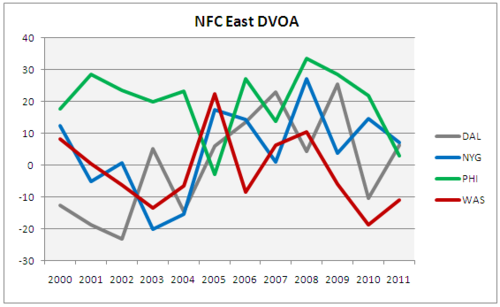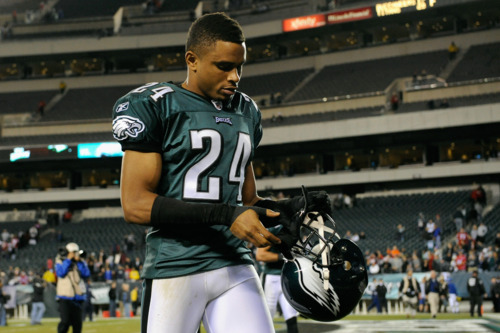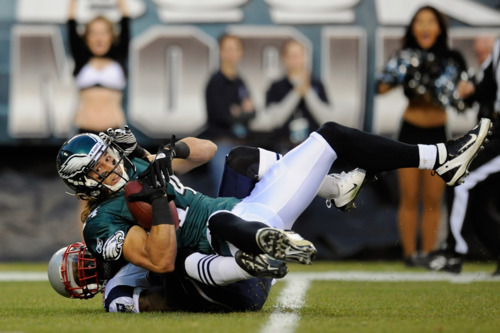Graham & Pierre-Paul
Les Bowen, for the Daily News:
Brandon Graham has fled Twitter lately, Graham said yesterday, because he is tired of fans’ critical comparisons with Giants defensive end (and NFC defensive player of the week) Jason Pierre-Paul.
“It’s ridiculous, how bad the fans are, saying how they wish they had JPP,” Graham said following yesterday’s practice. “I understand, ‘cause I haven’t done anything. I got nothing to say. That’s why I’ve been laying low, just can’t wait to erupt.”
I feel bad for Brandon Graham. Here’s hoping he can rebound in 2012.
Worst NFC East Ever?
It’s tough to watch this year’s NFC East. Eagles fans have long prided themselves on the fact that their team plays in one of the toughest divisions in the league. This year, that just isn’t true.
I charted the Football Outsiders overall team efficiency DVOA for each NFC East team since 2000. The results are below:

So it turns out, on a purely average DVOA basis, that this is not the worst NFC East in the last decade. In fact, this year’s group is barely below the 2010 average.
Perhaps the real reason this year’s group seems so awful has more to do with the lack of even one good team. To this point, among all “best teams in the NFC East,” this year’s Giants are by far the worst. In every year other than 2000, at least one team has posted a DVOA score of at least 20 percent, and the 2011 Giants would be no better than third in the division in any other year since 2005.
The way they’ve played this year, the Eagles should not have even the 3 percent chance they have of winning the division. Widespread mediocrity will do that for you.
Vick & Burress
Zach Berman, for the Daily News:
Vick’s influence on Burress stretched beyond football. When Burress was first released, Vick said Burress should think “family first and football second.” Burress said Vick maintained regular contact with Burress’ family, both over the phone and in person.
“He went through hell,” Burress said. “Him picking up the phone and calling my wife and checking up on her, seeing how she was doing emotionally. And Mike would spend time with my brother when I was away. Those are things you can’t put a price tag on. That’s just him.”
Whether or not DeSean Jackson is still an Eagle next year, Plaxico has to be near the top of the team’s free agent wish list. Signing Steve Smith instead was a big mistake.
A Lost Season for Brandon Graham
Jonathan Tamari, at Birds’ Eye View:
Graham knows Pierre-Paul’s numbers: 12.5 sacks, a big blocked field goal last week.
“It’s tough for me going through it because I’ve got to live with it,” Graham said, referring to the expectations and comparisons. At times, he doesn’t even want to go out because he knows the questions he will face from fans.
Rex Ryan, Poet
Rex Ryan on Michael Vick:
“He can throw a battleship through a strawberry.”
The Daily News staff buried the lead on that one.
Update: Other outlets, including the New York Post, have the quote as “He can throw a strawberry through a battleship.” Which does, I suppose, make slightly more sense.
What's Wrong With Nnamdi Asomugha?

While re-watching the Eagles win over the Dolphins, it was hard to miss another poor showing by Nnamdi Asomugha. The $60 million cornerback isn’t shutting down many wide receivers these days.
On Sunday, Brandon Marshall got by Asomugha for an early touchdown, and later Brian Hartline (!) beat him for a 24-yard gain. Those two plays were the only ones where Asomugha’s receiver was targeted, but they were both successful.
It’s tough to tell exactly what’s wrong with Asomugha. While adjusting to Juan Castillo’s questionable schemes, he deserved the benefit of the doubt. But at this point it’s clear that something else is going on. He’s 30 years old and may have lost a step or two. But I rarely see Asomugha getting simply outrun or otherwise beaten physically. In fact, he stuck with Larry Fitzgerald as well as anyone during the Cardinals game.
Instead, I have a new theory, one that I arrived at after replaying the Marshall touchdown nearly a dozen times.
On that play, Asomugha actually had solid coverage. Nate Allen provided help over the top, and Asomugha kept pace with Marshall, mirroring his movements underneath as he broke outside in the end zone. Then the ball arrived, and… nothing.
It was a great pass by Matt Moore, but Asomugha was in fair position to break it up. Instead, he seemed surprised that the ball arrived. He gave a half-hearted flail and the ball sailed right into Marshall’s arms.
Asomugha’s cross-field running mate, Asante Samuel, gets beat more often than Eagles fans would like. He stares into the backfield and tries to jump pass routes. But regardless of Samuel’s deficiencies, one gets the sense that he expects the ball to come his way. Not only that, but he welcomes it, he wants it. Sometimes Samuel will make a mistake and allow a needless big play, but he’s confident that if the quarterback looks his way enough, he’ll make him pay.
Watching the Marshall touchdown again, and reflecting on Asomugha’s performance this season, I think Nnamdi’s biggest problem might be that he has the opposite attitude. He doesn’t expect passes to come his way, and he doesn’t really want them.
The most effective tool Asomugha had was his aura of invincibility. Other than the 2006 season, he never had more than one interception in any of his first eight years in the league — not because he was bad, but because quarterbacks never threw at him. In the last three seasons combined Asomugha only allowed one touchdown, while never being targeted more than 30 times a year.
This year, he’s on pace for 43 targets, a 45 percent bump from 2010. This wasn’t unexpected, considering Samuel is better than any of the corners Asomugha played with in Oakland. But Asomguha’s corresponding decline was surprising.
In short, I don’t think Asomugha has suddenly become a bad cornerback. Although his advancing age and new responsibilities don’t help matters, perhaps his biggest obstacle is mental. In the last few years with Oakland, Nnamdi surely realized that as long as he gave reasonably good coverage, his reputation will keep quarterbacks from testing him.
That’s simply no longer the case. And until Asomugha adjusts to the new reality, both expecting and welcoming the challenge of passes thrown his way, he’ll continue to be a coverage liability.
Photo from Getty.
The Truth About Bad Luck

Friend of the blog Justin F. wrote a post at Bleeding Green Nation in which he calculated the Eagles’ Pythagorean win percentage, a metric that estimates a team’s wins based simply on points scored and allowed. Justin notes that the Eagles jump up to just over .500 if you calculate win percentage using the Pythagorean method (compared to .385 in real life). Then he offers a common explanantion:
So why is there a such a discrepancy between the Eagles’ actual win percentage and Pythagenport win percentage?
A very good question, and the answer probably is not what people want to hear and/or believe, although it is true. In one word: luck. In two words: bad luck.
What follows in the comments at BGN is a discussion that unfortunately devolves into rambling incoherency, where the luck explanation is aligned with a belief in stats and doubters read like WIP callers. But the truth is more nuanced.
Explaning the difference between actual and Pythagorean win percentage as “bad luck” is overly simplistic. That is one possible explanation, but should not be used as an all-encompassing default. Rather, we must examine whether bad luck is actually the cause.
There are certain well-known measures for luck in the NFL. For example, fumble recovery, field goal percentage, schedule strength, and injuries. However, the Eagles haven’t had a problem with any of those.
The Eagles have recovered 48 percent of fumbles, just barely below average. They’re 10th-best in field goal percentage, with Alex Henery hitting 86 percent. Meanwhile, Eagles opponents are actually worst in the NFL, making only 65 percent of their attempts. The Eagles have faced the 18th-hardest DVOA schedule, and the three games Michael Vick lost to injury were average. No evidence of bad luck here.
However, there are plenty of other non-luck outlying factors that could account for the actual-Pythagorean discrepancy. Factors like:
- 30th in the NFL in opponent red zone TD percentage.
- 26th in fourth quarter points allowed.
- 32nd in interception percentage.
- 25th in first down-inducing penalties.
- 19th in DVOA variance.
- 27th in missed tackles (as of week nine).
If you’re going to call the 2011 Eagles underachieving — a label I’m not adverse to using — don’t blame it on the easy out. Luck is always involved, but it shouldn’t be an automatic determination. The above factors are much more likely to be the cause.
Photo from Getty.
